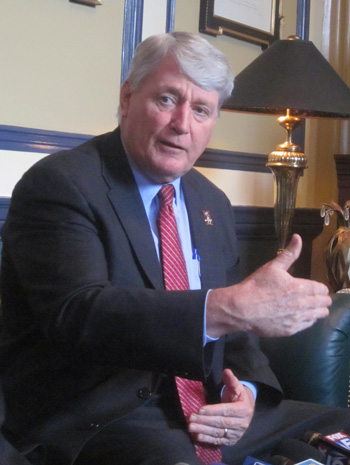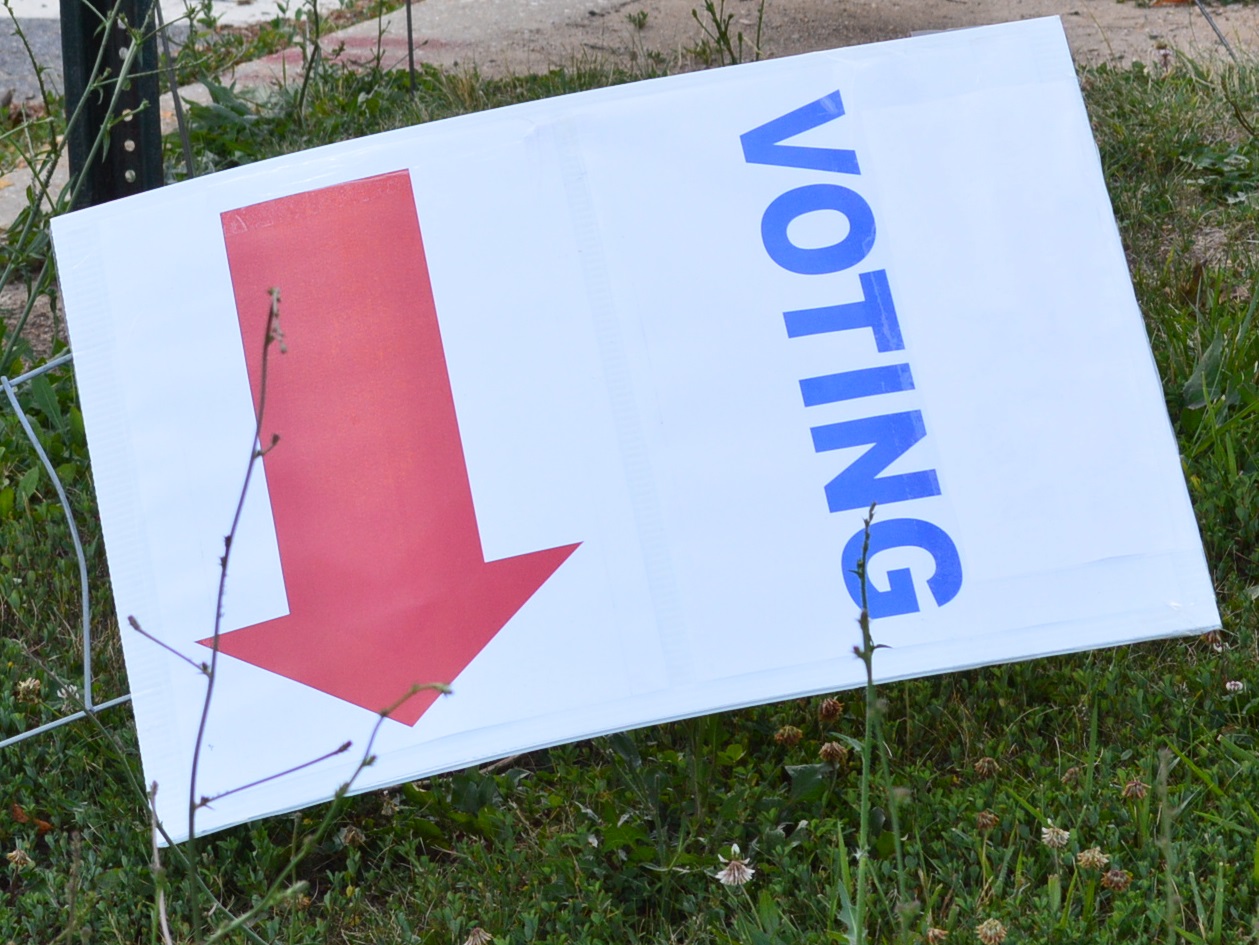By Len Lazarick
Len@MarylandReporter.com
 Maryland is taking on a significant fiscal role in developing the tests that will assess students based on Common Core curriculum standards, agreeing to administer $96 million in federal grants to create the tests.
Maryland is taking on a significant fiscal role in developing the tests that will assess students based on Common Core curriculum standards, agreeing to administer $96 million in federal grants to create the tests.
The Board of Public Works approved the contract for the State Department of Education to administer the U.S. grant. Gov. Martin O’Malley said the contract was being done at the request of U.S. Education Secretary Arne Duncan, after Florida decided to stop overseeing the funding.

Board of Public Works: State Treasurer Nancy Kopp, Gov. Martin OMalley and Comptroller Peter Franchot (File photo)
The tests are being developed for 18 states and the District of Columbia as part of the implementation of new college and career readiness standards usually referred to as Common Core.
“We’re picking up the ball after Florida dropped it,” said O’Malley, who chairs the three-member board that must approve all major state contracts. “We’re doing the president a favor here.”
Common Core controversy
Common Core and the federal government’s involvement in curriculum has stirred controversy across the nation, and the speed of its implementation in Maryland has raised concerns among teachers and parents.
Comptroller Peter Franchot highlighted those concerns at Wednesday’s meeting and voted against the contract.
“I think we’re becoming obsessed with these standardized exams,” said Franchot.
“Conceptually, I’m in favor of what you’re doing. There’s a lot of concern about the rush to implementation … going too fast too soon.”
Franchot also questioned Florida’s procurement process for the contract.
While the dollar figures are large, Maryland’s role as fiscal agent involves only four bureaucrats who will oversee money flowing to a nonprofit group and seven testing contractors. Over $86 million of the grants have already been awarded.
PARCC will replace MSA tests; no minority contractors
The Partnership for the Assessment of Readiness for College and Career Inc. (PARCC) in Washington is overseeing development of the tests. They will be taken in various grades, replacing the Maryland School Assessment that has been administered for years.
One of the goals of PARCC is to have all students take the tests on computers, which raised concerns because of problems in the roll out of the Maryland Health Exchange website.
O’Malley told the education staff to make sure that the computerized tests were being overseen by IT professionals, and not policymakers or educators.
State Schools Superintendent Lillian Lowery also said the tests could be used to assess students at the beginning of the school year and then track their progress.
Because the PARCC Inc. organization is already doing the work, the contract was awarded to it as “a sole source,” with no competitive bidding. There are also no minority business enterprises involved in the current contract, which stirred the anger of Arnold Jolivet, president of the Maryland Minority Contractors Association.
“I’m offended, I’m offended, I’m offended,” Jolivet told the Board of Public Works. The contract has “not one dime for the minority business community.”
He urged the board to reject the contract because “it is tinged with racial discrimination and exclusionary practices.”
But it was urgent to get the contract approved since Florida is giving up its role at the end of the month.
“We feel kind of saddled here by this contract,” O’Malley said.
State Schools Superintendent Lillian Lowery did her best to defend the contract from the assaults by Franchot and Jolivet. She brought up her chief of staff, a financial officer and an assistant attorney general to describe how the contract was supposed to work and why it was legal.
She emphasized that the testing was a completely separate issue from the implementation of Common Core by school systems around the state
PARCC’s CEO Laura McGiffert Slover said the bulk of the money is “pass through” to the contractors. They include ETS and Pearson, which already produce Maryland’s current assessment tests.
“In the end, the U.S. Department of Education has final sign off,” Slover said. “There are multiple tiers of checks and balances with the system.”
More minority contractors urged
O’Malley urged Slover to actively recruit minority vendors for opportunities for the remaining $10 million that has not been awarded, and said the state would be monitoring that performance.
“We will be very aggressive,” Slover said.
One of the goals of PARCC is to have all students take the tests on computers, which raised concerns because of problems in the roll out of the Maryland Health Exchange website.
O’Malley told the education staff to make sure that the computerized tests were being overseen by IT professionals, and not policymakers or educators.









Why would anyone want our failed president campaigning for them? Governor O’Malley, did you see Obama’s approval rating? You may want to rethink this if you want any chance at becoming President.
And why would anyone want to teach the garbage contained in Common Core? Especially when the rest of the world and most of America will be teaching very differently. Did you see the math? It will handicap the children of Maryland.
Considering that Maryland is about the only democratic state left for Obama to send this to still backing any of the Race to the Top I would point out that by the time these policies/tests are developed no one will be using them. Also, given that Maryland has a long history of failed development of public policy, skewed data for government agencies, and tons of corruption with public money, it shows that however is awarding these grants fail to use best practices in coming to awards. WAKE UP people!
As we see below almost every state in the US has a powerful movement against these reforms, academic research is showing no benefit and often negative benefit from them so far, and even ground zero of the charter movement, Wall Street and NYC’s Bloomberg is backing down from these reforms. So why is Maryland moving forward? This is about privatizing K-12 and O’Malley is committed to handing our public schools to Wall Street….it is why they let him run for President after all!
Race to the Top is simply building a structure for private K-12 schools attached to a vocation/business and will cheapen school operations while using data collected from evaluations and test to sell as profit. That is all this is about….making businesses from education. O’Malley spent both terms making our public universities into corporate extensions and now he is pushing for this K-12 move as well.
The problem for MD citizens is that since most in the state do not want this, all this public money will be wasted. Never fear says O’Malley’s team, the point is getting it to the right private contractor for profit after all! Look at the health care system build-out!
Day Of Action Reveals Widespread Anger With Current Education Policies
“We have to fight for our children’s education.”
Those words, from Philadelphia parent Kia Hinton, crystalized a national sentiment expressed during a Day of Action to Reclaim the Promise of Public Education held on December 9 in over 100 sites across the country.
The multiple events
– held from Maine to San Francisco, New Orleans to Minneapolis/St.
Paul – constituted “the largest coordinated action to reclaim the
promise of public education in recent memory,” according to a statement
from the American Federation of Teachers, a lead organizer and sponsor
of the various actions.
The events took on many forms – from street protests and rallies to
town halls and news conferences – but there were common grievances
overlapping the events.
Over and over, voices at these events complained of lack of resources
for their schools and inequality of how resources are spread.
Whether they were teachers calling out unfair evaluations, parents
decrying of high-stakes testing, or students criticizing unfair
discipline policies, they all expressed feelings of being no longer in
control of their education destinies.
And numerous voices in the audiences of these events pointed to
governing policies that increasingly are perceived as being driven by
corruption and profit making rather than the best interest of students.
Voices From The Streets
At a protest rally in Pittsburgh,
a local organizer complained, “Our kids have lost kindergarten, music
[and] art … We want smaller class sizes…we want our librarians back.”
At a protest in Syracuse,
a representative from a parent group stated, “Not every child gets the
same kind of education in New York state … It depends on who you’re
born to and where they live, what kind of opportunities are available
to you, and that’s not just right … It’s not fair and it doesn’t serve
our society.”
A parent speaking at the event in Newark, New Jersey,
urged the audience to take back the control of local schools that are
now governed by an unelected board. “We need to get back our local
control,” she said. “No one’s held accountable. They get to do
everything they want.”
Protestors in New Orleans
staged their event in front of a school scheduled for closure, which
will force parents into the district’s complicated and unfair “choice”
system that sends many NOLA students to distant campuses in other parts
of town.
“Why do I
have to look elsewhere if I shop here, if I pay taxes here, if I live
here?” one of the organizers said. “It’s not a failing school. It’s a
failing system that set up this school.”
In Columbus, Ohio,
reporters described an audience of “educators, parents, labor, and
faith leaders” who protested Governor John Kasich’s record of cutting
school spending, “while giving money to failing, for-profit charter
schools.”
In Chicago,
a protest organizer, Jonathan Stith of the Alliance for Educational
Justice, complained of “current school reform efforts by corporate
education profiteers” that have “bankrupted public education.”
Just How Big
The wide range of locations for Monday’s events, and the numbers of
participants, are testament to the breadth and depth of complaints about
current education policies.
In New York state,
events were held in Nyack, Albany, Binghamton, Rochester, Syracuse,
New York City, Yonkers, and the Buffalo suburb of West Seneca.
In Washington D.C.,
“close to 600 people” endured inclement weather and “packed a high
school auditorium … to ask questions of the leading mayoral candidates
and serve notice that the community is united behind ‘putting the public
back in public education.’”
In Philadelphia, according to the local news report that quoted
Hinton, crowds of parents, students, and advocates rallied outside the
regional office of Pennsylvania governor Tom Corbett, calling for
increased funding for that could help with the city’s endless budget
crisis.
“The turnout so big, they took over South Broad Street and forced the street to shut down,” the reporter said.
Cross state, in Pittsburgh,
local press reported, “more than 100? people gathered outside the
governor’s local office to listen to speakers, chant slogans, and wave
signs that read, “Education Not for Sale” and “Support Funding for
Public Education.”
According to a local news report from Chicago,
“A couple hundred parents, students, and teachers braved the frigid
night air on Monday to deliver their holiday wish list to Mayor Rahm
Emanuel and Governor Pat Quinn: Stop school closings, end the
privatization of neighborhood public schools, and eliminate mayoral
control of the school board.”
At the event in Newark, “some 200 advocates marched to the Newark Public Schools offices and to City Hall.”
“More than 300 supporters gathered,” in Austin, Texas,
“to hear speakers address the most pressing issues in Texas schools,
including education equity and comprehensive immigration reform.”
In San Francisco, “Over 200 people came out to take a stand” for public education and local schools.
A Mandate From The Progressive Movement
What’s also clear about Monday’s events is that there is widespread
evidence that public education has become a rallying point for a huge
cross section of the progressive community, including labor leaders,
educators, clergy, members of immigrant communities, civil rights
activists, representatives from grassroots student and parent groups,
and community organizers fighting for fair housing, economic fairness,
and other causes.
Many of the participants in Monday’s Day of Action may not have been
aware that the impetus for their event began in a hotel in downtown Los Angeles in October – a mere two months prior to this national outpouring.
At that meeting – billed
as a combined “organizing summit” and a “conference on civil, human,
and women’s rights” – hundreds of activists and organizers gathered to
voice a common commitment to public education and to plan specific
courses of action to disrupt what most in the audience described as a
“corporate model of school reform.”
Those 500 or so attendees provided the catalyst for Monday’s events and unified them under a document proclaiming “The Principles That Unite Us”.
No one at any of these events spoke about quick wins or easy success.
One of the organizers of the Chicago event, Jitu Brown
from the city’s South Side, said, “It’s not about doing action and
then by magic conditions change … We’re setting the tone change by
having parents, teachers, and communities come together around a common
set of principles. It’s a marathon, not a sprint.”
Indeed, given Monday’s massive showing, the movement to change
directions in education policies appears to only be getting started.
PARCC is a quixotic attempt to build consensus. Of course, consensus is no longer needed post-Obamacare.
The politics over Federal dominance of Education standards were too hot a potatoe for Gov. Scott (Florida) to countenance, so he vacated the money. Arnie Duncan’s decision to transfer the money to MD is an excellent decision in view of MD outstanding track record of “stewardship” if one defines the term as zealously spending OPM.
The Department of Education, which has never educated one child since it was created, needed a new State to be the second layer of a giant pyramid of overhead and bureaucracy in order to finish the studies about how to measure student learning. It’s a quixotic exercise and a waste of money because of the utter void of consensus about the Federal role in educating kids.
Here we go again, a favor for Obama!!!
No critical discussion about the reasons why Florida does no longer want to complete this study, relevant or not. Maryland citizens can now pay for the cost overruns which will be hidden in the Department of Education.
Obama will now “maybe perhaps ” campaign for O’Malley thanks to your dollars, the few remaining after all the taxes.